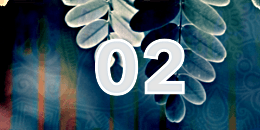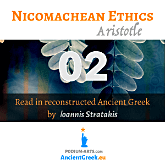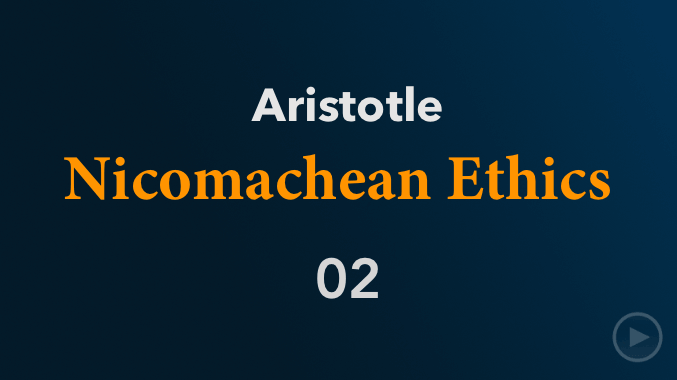• Nicomachean Ethics 02 •
• Aristotle •

Duration: 44 min 30 sec
Unabridged
Recorded: 2024
Price : $/€ 21 (audio), 40 (video)
About “Nicomachean Ethics" 02 by Aristotle
The second book of Aristotle’s Nicomachean Ethics (Gr.: Ἠθικὰ Νικομάχεια) focuses on the nature and development of virtue, laying out the foundation of moral character. Aristotle begins by distinguishing between intellectual and moral virtues. Intellectual virtues arise from teaching and require experience and time, while moral virtues are acquired through habit. He asserts that virtues are not innate but developed through repeated actions. By engaging in virtuous activities, we cultivate virtuous character traits.
Aristotle introduces the concept of the "mean" relative to us, emphasizing that virtue lies between two extremes—deficiency and excess. For example, courage is a mean between cowardice (deficiency) and rashness (excess). Each virtue, then, is a balance between two vices. Aristotle argues that finding the right mean is challenging and requires practical wisdom (phronesis), as the right balance varies from person to person and situation to situation.
He explains that actions are not virtuous simply by being of a certain kind; they must also be performed with the right motive and understanding. To be truly virtuous, one must act knowingly, choose the act for its own sake, and do so from a firm and stable character.
Aristotle also notes that habits shape our character. By consistently choosing the mean in our actions, we develop a stable disposition toward virtue. However, certain actions, like theft or murder, are inherently wrong and have no mean.
In conclusion, the second book emphasizes that virtue is a matter of habit, deliberate choice, and practical wisdom. By consistently practicing moderation and making the right choices, individuals can develop a virtuous character, which is essential for living a flourishing and ethical life.
You can follow the Greek text of “Nicomachean Ethics” book 2 by Aristotle, online at Archive.org.
Many editions with translation in English can be found at Archive Books.
about Aristotle
Aristotle (Gr.: Ἀριστοτέλης), one of the most important philosophers of Antiquity, was born in 385 BCE in Stageira of Chalkidike. Born in a rich family he had the opportunity to get high education. From 367 BCE on and for about twenty years, he studied philosophy in Athens by Plato and also taught in his Academy. After the death of Plato he moved to the city of Assus in Asia Minor, where he taught philosophy until 345 BCE., when he accepted an invitation by Theophrastus to teach in Mytilene. In 342 BCE King Philippus asked him to teach his 13 years old son, Alexander. After the death of Philippus Aristotle returned to Athens and established the “Lyceum”, where he set his teaching forth. However, after the death of Alexander in 323 BCE and having been accused by opponents for disrespect, he retired in Chalkis. He died in 322 BC from some stomach disease.
Aristotle left a lot of works. The works that have survived are distinguished in logical, physical, biological, psychological, metaphysical, moral, political, technological and various problems.
The Aristotelian works have included the following, which are not considered genuine: Physiognomy, About Miraculous Things Heard, About Colors, Mechanics, Rhetoric to Alexander and On Hearing.
About the audio~videobook
 The recording contains the complete, unabridged Ancient Greek text of the Aristotelian “Nicomachean Ethics book 2”. The videobook shows the highlighted Greek text simultaneously with the reading.
After purchase you will be able to download the relevant file(s), containing the work in mp3 a/o mp4 format.
The recording contains the complete, unabridged Ancient Greek text of the Aristotelian “Nicomachean Ethics book 2”. The videobook shows the highlighted Greek text simultaneously with the reading.
After purchase you will be able to download the relevant file(s), containing the work in mp3 a/o mp4 format.
The videobook comes with (optional) captions in English. Other languages on request.
You can listen to the first chapter (2.1) of “Nicomachean Ethics, book 02”, an audio sample of the present audiobook. Please, click on the play-button bellow and, if you wish, follow the Ancient Greek text lower on the page, or alternatively watch the video, which is provided with a quick translation in English. Thank you!
ΗΘΙΚΑ ΝΙΚΟΜΑΧΕΙΑ 02.01
Διττῆς δὴ τῆς ἀρετῆς οὔσης, τῆς μὲν διανοητικῆς τῆς δὲ ἠθικῆς, ἡ μὲν διανοητικὴ τὸ πλεῖον ἐκ διδασκαλίας ἔχει καὶ τὴν γένεσιν καὶ τὴν αὔξησιν, διόπερ ἐμπειρίας δεῖται καὶ χρόνου, ἡ δ’ ἠθικὴ ἐξ ἔθους περιγίνεται, ὅθεν καὶ τοὔνομα ἔσχηκε μικρὸν παρεγκλῖνον ἀπὸ τοῦ ἔθους. ἐξ οὗ καὶ δῆλον ὅτι οὐδεμία τῶν ἠθικῶν ἀρετῶν φύσει ἡμῖν ἐγγίνεται· οὐθὲν γὰρ τῶν φύσει ὄντων ἄλλως ἐθίζεται, οἷον ὁ λίθος φύσει κάτω φερόμενος οὐκ ἂν ἐθισθείη ἄνω φέρεσθαι, οὐδ’ ἂν μυριάκις αὐτὸν ἐθίζῃ τις ἄνω ῥιπτῶν, οὐδὲ τὸ πῦρ κάτω, οὐδ’ ἄλλο οὐδὲν τῶν ἄλλως πεφυκότων ἄλλως ἂν ἐθισθείη. οὔτ’ ἄρα φύσει οὔτε παρὰ φύσιν ἐγγίνονται αἱ ἀρεταί, ἀλλὰ πεφυκόσι μὲν ἡμῖν δέξασθαι αὐτάς, τελειουμένοις δὲ διὰ τοῦ ἔθους. ἔτι ὅσα μὲν φύσει ἡμῖν παραγίνεται, τὰς δυνάμεις τούτων πρότερον κομιζόμεθα, ὕστερον δὲ τὰς ἐνεργείας ἀποδίδομεν (ὅπερ ἐπὶ τῶν αἰσθήσεων δῆλον· οὐ γὰρ ἐκ τοῦ πολλάκις ἰδεῖν ἢ πολλάκις ἀκοῦσαι τὰς αἰσθήσεις ἐλάβομεν, ἀλλ’ ἀνάπαλιν ἔχοντες ἐχρησάμεθα, οὐ χρησάμενοι ἔσχομεν)· τὰς δ’ ἀρετὰς λαμβάνομεν ἐνεργήσαντες πρότερον, ὥσπερ καὶ ἐπὶ τῶν ἄλλων τεχνῶν· ἃ γὰρ δεῖ μαθόντας ποιεῖν, ταῦτα ποιοῦντες μανθάνομεν, οἷον οἰκοδομοῦντες οἰκοδόμοι γίνονται καὶ κιθαρίζοντες κιθαρισταί· οὕτω δὴ καὶ τὰ μὲν δίκαια πράττοντες δίκαιοι γινόμεθα, τὰ δὲ σώφρονα σώφρονες, τὰ δ’ ἀνδρεῖα ἀνδρεῖοι. μαρτυρεῖ δὲ καὶ τὸ γινόμενον ἐν ταῖς πόλεσιν· οἱ γὰρ νομοθέται τοὺς πολίτας ἐθίζοντες ποιοῦσιν ἀγαθούς, καὶ τὸ μὲν βούλημα παντὸς νομοθέτου τοῦτ’ ἐστίν, ὅσοι δὲ μὴ εὖ αὐτὸ ποιοῦσιν ἁμαρτάνουσιν, καὶ διαφέρει τούτῳ πολιτεία πολιτείας ἀγαθὴ φαύλης. ἔτι ἐκ τῶν αὐτῶν καὶ διὰ τῶν αὐτῶν καὶ γίνεται πᾶσα ἀρετὴ καὶ φθείρεται, ὁμοίως δὲ καὶ τέχνη· ἐκ γὰρ τοῦ κιθαρίζειν καὶ οἱ ἀγαθοὶ καὶ κακοὶ γίνονται κιθαρισταί. ἀνάλογον δὲ καὶ οἰκοδόμοι καὶ οἱ λοιποὶ πάντες· ἐκ μὲν γὰρ τοῦ εὖ οἰκοδομεῖν ἀγαθοὶ οἰκοδόμοι ἔσονται, ἐκ δὲ τοῦ κακῶς κακοί. εἰ γὰρ μὴ οὕτως εἶχεν, οὐδὲν ἂν ἔδει τοῦ διδάξοντος, ἀλλὰ πάντες ἂν ἐγίνοντο ἀγαθοὶ ἢ κακοί. οὕτω δὴ καὶ ἐπὶ τῶν ἀρετῶν ἔχει· πράττοντες γὰρ τὰ ἐν τοῖς συναλλάγμασι τοῖς πρὸς τοὺς ἀνθρώπους γινόμεθα οἳ μὲν δίκαιοι οἳ δὲ ἄδικοι, πράττοντες δὲ τὰ ἐν τοῖς δεινοῖς καὶ ἐθιζόμενοι φοβεῖσθαι ἢ θαρρεῖν οἳ μὲν ἀνδρεῖοι οἳ δὲ δειλοί. ὁμοίως δὲ καὶ τὰ περὶ τὰς ἐπιθυμίας ἔχει καὶ τὰ περὶ τὰς ὀργάς· οἳ μὲν γὰρ σώφρονες καὶ πρᾶοι γίνονται, οἳ δ ̓ ἀκόλαστοι καὶ ὀργίλοι, οἳ μὲν ἐκ τοῦ οὑτωσὶ ἐν αὐτοῖς ἀναστρέφεσθαι, οἳ δὲ ἐκ τοῦ οὑτωσί. καὶ ἑνὶ δὴ λόγῳ ἐκ τῶν ὁμοίων ἐνεργειῶν αἱ ἕξεις γίνονται. διὸ δεῖ τὰς ἐνεργείας ποιὰς ἀποδιδόναι· κατὰ γὰρ τὰς τούτων διαφορὰς ἀκολουθοῦσιν αἱ ἕξεις. οὐ μικρὸν οὖν διαφέρει τὸ οὕτως ἢ οὕτως εὐθὺς ἐκ νέων ἐθίζεσθαι, ἀλλὰ πάμπολυ, μᾶλλον δὲ τὸ πᾶν.
